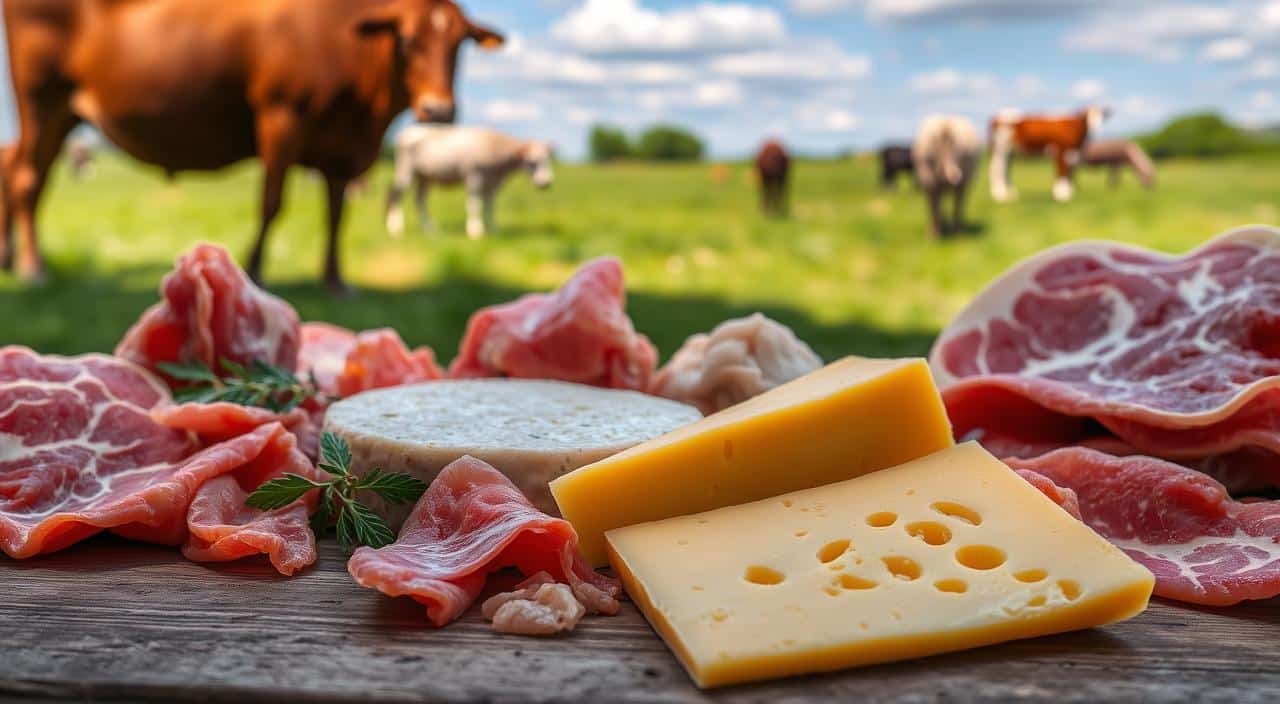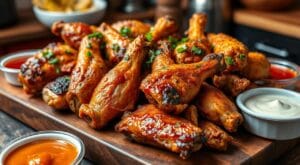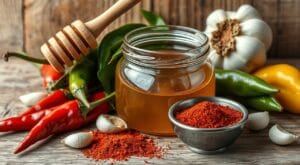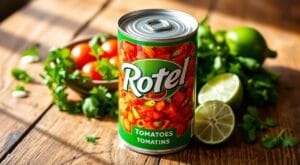Jump to:
Estimated reading time: 12 minutes
Table of contents
There’s nothing quite like the taste of creamy Brie or the sharp Cheddar. Cheese can be a delicious treat. But, can you eat cheese on the carnivore diet? Does your favorite dairy product have to go?
Don’t worry, you can still enjoy cheese on the carnivore diet. But, it depends on who you ask. We’ll explore the good and bad of cheese on the carnivore diet today. You’ll learn which cheese is best and how to add it to your meals.
Is cheese ok on a carnivore diet? Key Takeaways
- The carnivore diet is a high-protein, low-carb way of eating focused on animal-based foods.
- Cheese can be a part of the carnivore diet, but the type and amount matter.
- Hard, aged cheeses like Cheddar and Parmesan are generally considered the best options for carnivores.
- Soft cheeses and processed cheeses are typically not recommended on the carnivore diet.
- Cheese should be consumed in moderation on the carnivore diet, as it can be calorie-dense.
Is cheese ok on a carnivore diet? Introduction
If you’re on the carnivore diet, you might wonder about cheese. This diet focuses on animal foods, making dairy products like cheese a bit of a mystery. We’ll look into how cheese fits into a carnivore diet and offer tips to help you decide.
The carnivore diet is very strict, cutting out most plant foods. It emphasizes meat, animal fats, and other animal products. Some people on this diet eat cheese, while others don’t, based on their diet’s core principles.
We’ll examine the good and bad of cheese in a carnivore diet. This info is for both those deeply into the carnivore diet and those just curious. You’ll learn how to decide if cheese fits into your diet.
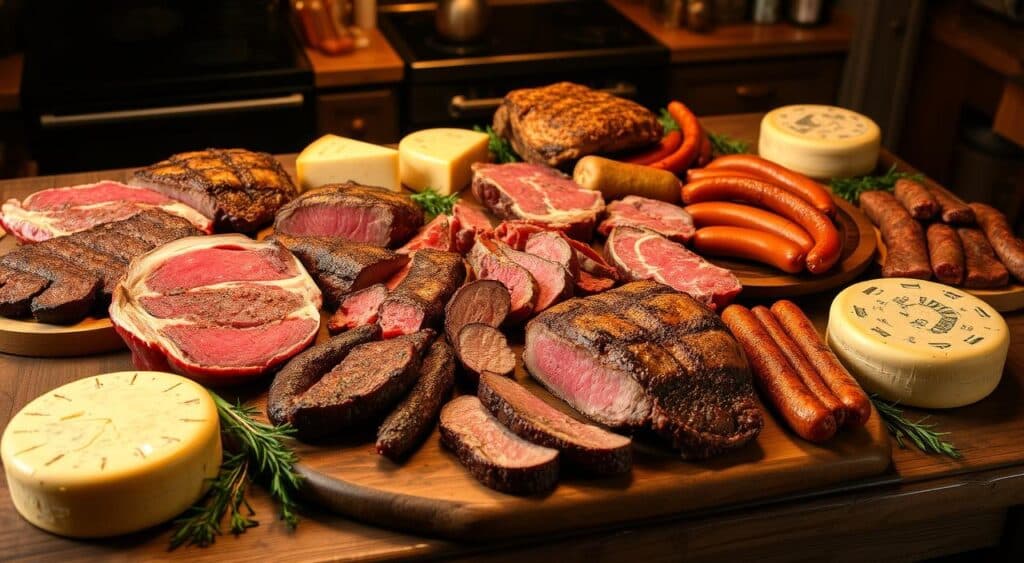
“The carnivore diet is extremely restrictive and lacks essential nutrients like fiber, vitamin C, and folate.”
When we talk about cheese in the carnivore diet, keep an open mind. Understanding different views and considerations is key. This way, you can choose what’s best for your health and taste.
Benefits of Cheese on a Carnivore Diet
Cheese is a great addition to a carnivore diet. It offers nutrition, protein, and fat. It’s also packed with vitamins and minerals. This makes cheese a good choice for those on this diet.
Is cheese ok on a carnivore diet? Nutritional Value of Cheese
Cheese is full of high-quality protein. It has all the amino acids needed for muscles and repair. The fat in cheese is also good for energy, brain function, and hormones.
Is cheese ok on a carnivore diet? High-Fat Content
Cheese’s high fat content is great for a carnivore diet. It helps keep the right balance of fat to protein. Cheeses like Creamy Blue Cheese and Triple Cream Brie are good choices.
Is cheese ok on a carnivore diet? Essential Vitamins and Minerals
Cheese is also rich in vitamins and minerals. It has calcium, vitamin K, and vitamin D. These nutrients are important for bones, the immune system, and health.
Adding cheese to your diet brings many health benefits. It also makes the diet more enjoyable and sustainable.
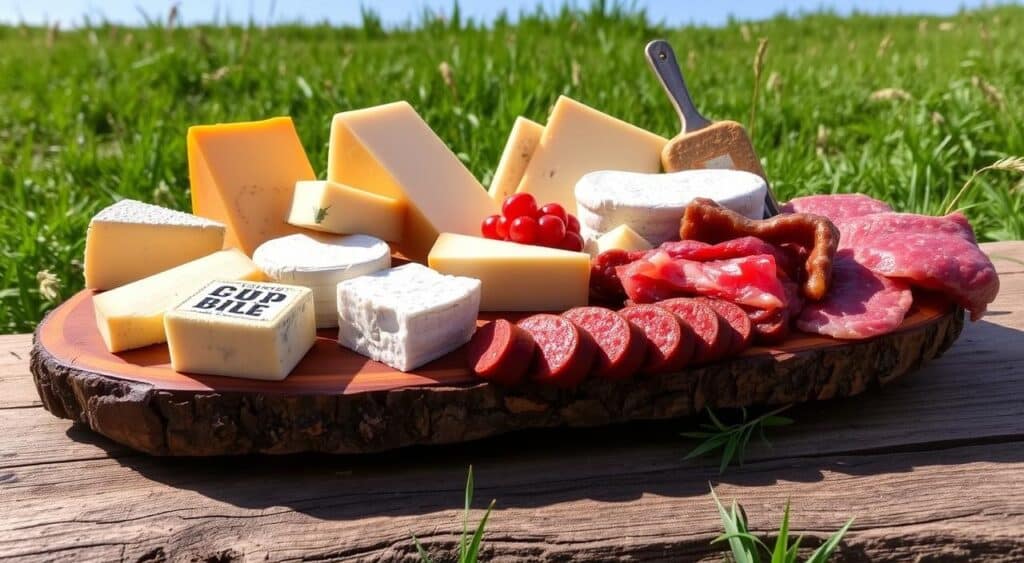
Best Types of Cheese for a Carnivore Diet
For those on a carnivore diet, cheese is a great addition. It brings important nutrients and variety to your meals. There are three main types to choose from: hard cheeses, soft cheeses, and fermented cheeses.
Hard Cheeses
Hard cheeses like Cheddar, Parmesan, Mozzarella, and Gouda are perfect for the carnivore diet. They have less carbs and more protein and fat. This fits well with the diet’s focus on high protein and low carbs. Parmesan is especially good because it’s full of calcium and phosphorus, helping your bones.
Soft Cheeses
Soft cheeses like Cream Cheese and Cottage Cheese are also good for the carnivore diet. They’re lighter and often have more protein. This makes them a creamy and satisfying addition to meals or snacks. Cottage cheese is a great source of protein and can be used in many carnivore-friendly dishes.
Fermented Cheeses
Fermented cheeses, such as Roquefort and Gorgonzola, have a unique taste and health benefits. They are higher in fat and lower in carbs, fitting the carnivore diet well. The fermentation process also makes nutrients more available, adding to their nutritional value.
When picking cheeses for your carnivore diet, choose high-quality, natural ones. Avoid cheeses with added sugars, preservatives, or other non-compliant ingredients. By focusing on these three types of cheese, you can enjoy their rich flavors and nutritional benefits while following the carnivore diet.
| Cheese Type | Calories (per 100g) | Fat (g) | Carbohydrates (g) | Protein (g) | Fat-to-Protein Ratio |
|---|---|---|---|---|---|
| Creamy Blue Cheese | 425 | 43.3 | 0.2 | 13.3 | 3.25:1 |
| Saint Andre Triple Cream Soft Ripened Cheese | 420 | 42 | 0 | 10.5 | 4:1 |
| Cheddar Cheese | N/A | 33 | 3 | 23 | 1.4:1 |
| Cream Cheese | N/A | 35 | 1 | 7 | 5:1 |
“Cheese can be a valuable addition to the carnivore diet, providing essential nutrients and adding flavor and variety to your meals.”
How Much Cheese Is Too Much?
While cheese can be part of the Carnivore diet, it’s key to eat it in moderation. Cheese is calorie-dense, and too much can slow down weight loss or even cause weight gain. The Carnivore diet aims for a high-protein, low-carb diet. So, cheeses with carbs might not be the best choice.
Daily Recommendations
The Carnivore diet suggests eating 1-2 ounces of cheese daily. This balance helps keep your cheese portion size in check with the carnivore diet macros. Eating more than this can lead to cheese overconsumption and might block your weight loss goals.
Signs of Overconsumption
Watch out for digestive issues, cravings, or stalled weight loss. These could mean you’re eating too much cheese. Listen to your body and adjust your cheese intake as needed.
Balancing Cheese with Other Foods
To keep cheese intake balanced, think of it as a topping or side. Pair it with other Carnivore-approved foods like meat, eggs, or low-carb veggies. This way, you get a more satisfying and balanced meal.
“Moderation is key when it comes to cheese on the Carnivore diet. Enjoy it as a flavorful addition, but be mindful of your intake to avoid any negative impacts on your weight loss or health.”
Dairy Sensitivities and the Carnivore Diet
The carnivore diet focuses on animal-based foods, but it can be tricky with dairy. Many adults have lactose intolerance, causing bloating, gas, and diarrhea. But, most cheeses, especially aged varieties like Cheddar and Parmesan, have less lactose.
Lactose Intolerance
Lactose intolerance is common among adults. It can cause bloating, diarrhea, and stomach pain, especially on the carnivore diet. Luckily, many cheeses are low in lactose, making them good for those with lactose intolerance.
Casein Sensitivity
Some people on the carnivore diet also worry about casein sensitivity. Casein in dairy can cause inflammation in sensitive individuals. Aged cheeses like Parmesan, Cheddar, and Gouda might be easier to digest for those with dairy sensitivities.
Aged Cheese Options for Sensitive Individuals
The aging process of cheeses like Parmesan, Cheddar, and Gouda breaks down lactose and casein. This makes them easier to digest for those with dairy sensitivities. These aged cheeses are great for adding dairy to a carnivore diet without digestive problems.
| Cheese Type | Lactose Content | Casein Sensitivity | Nutritional Benefits |
|---|---|---|---|
| Parmesan | Low | Low | High in protein, low in calories and carbs |
| Cheddar | Low | Low | Good source of calcium and vitamin B12 |
| Gouda | Low | Low | Rich in vitamin K2 and beneficial fatty acids |
By choosing aged cheeses and being aware of their dairy sensitivities, people on the carnivore diet can enjoy dairy’s benefits. This helps avoid digestive discomfort.
Incorporating Cheese into Carnivore Meals
Cheese is a great addition to your carnivore diet. It’s a tasty and nutritious cheese snack that offers protein, calcium, and healthy fats. You can also use it to top steak or burgers, or make cheese-based sauces and casseroles.
Cheese as a Snack
For carnivore recipes, cheese makes a perfect snack. Choose hard, aged cheeses like cheddar, parmesan, or gouda. They’re low in lactose and rich in fat and protein, fitting well with the carnivore diet.
Cheese in Main Dishes
Adding cheese to main dishes can enhance flavor and nutrition. Try topping steak or burgers with cheddar or blue cheese. Or, use cream cheese or cottage cheese to make creamy sauces that go great with your meats.
Using Cheese in Carnivore Recipes
When picking cheese in carnivore meals, go for hard, aged cheeses or soft cheeses like cottage cheese or cream cheese. These are best for the carnivore diet. Try different cheeses to find what you like best.
| Cheese Type | Nutritional Benefits | Recommended for Carnivore Diet |
|---|---|---|
| Cheddar | High in protein, calcium, and vitamin B12 | Yes |
| Parmesan | Low in carbs, high in protein and calcium | Yes |
| Goat Cheese | Easier to digest than cow’s milk cheese, high in healthy fats | Yes |
| Cottage Cheese | High in protein, low in carbs, provides a different texture | Yes |
| Cream Cheese | High in fat, low in carbs, versatile for cooking and baking | Yes |
Can You Lose Weight with Cheese on Carnivore?
The Carnivore diet focuses on meat, eggs, and dairy, excluding plants. Adding cheese to this diet is a bit tricky. Cheese can be good for you and help with ketosis. But, it’s key to pick the right cheese and eat it in small amounts to avoid weight gain.
Cheese and Ketosis
Cheese is high in fat, which helps with ketosis. This is when your body uses fat for energy instead of carbs. This can help you lose weight, as the Carnivore diet limits carbs. But, some cheeses have more carbs, so choose wisely.
Effect on Insulin Levels
Even though cheese is low in carbs, it can still raise insulin levels if eaten too much. High insulin can make losing weight harder. So, watch how much you eat and pick cheeses that don’t raise insulin much.
Choosing the Right Cheese for Weight Loss
To help with weight loss on the Carnivore diet, pick cheeses that are low in carbs and high in fat. Hard cheeses, aged cheeses, and some soft cheeses like brie or goat cheese are good choices. These cheeses have less effect on insulin and can be part of your meals and snacks without ruining your diet.
For successful weight loss on the Carnivore diet, balance cheese’s benefits with its effects on insulin and ketosis. Be careful with how much cheese you eat and choose the right types. This way, you can enjoy cheese’s nutritional benefits while working towards your weight loss goals.
Cheese Alternatives on Carnivore Diet
If you’re on the carnivore diet and can’t or don’t want to eat cheese, don’t worry. There are other healthy fats and nutrients you can use. Options like butter, ghee, animal fats, and bone broth are great for your meals.
Butter and Ghee
Butter and ghee come from animals and are good for the carnivore diet. They have healthy fats like CLA and butyrate, which are good for you. Use them for cooking, as a spread, or in sauces to add flavor and creaminess.
Animal Fats
Animal fats like tallow and lard are also great for the carnivore diet. They give you lots of energy and make your food taste better. Use them for sautéing, roasting, or making mayonnaise or salad dressings.
Bone Broth as a Supplement
Bone broth is also a good choice for the carnivore diet. It’s full of collagen, gelatin, and minerals that are good for your health. Drink it as a beverage or use it in soups, stews, and sauces for extra nutrition.
By using these alternatives like butter, ghee, animal fats, and bone broth, you can keep enjoying a high-fat, high-protein diet. You’ll meet your nutritional needs and still have options you like.
Frequently Asked Questions
Can you eat cheese on a carnivore diet?
Yes, many people on the carnivore diet include cheese, as it is an animal-based product rich in fats and protein. However, some strict versions of the diet exclude dairy due to its lactose and potential for causing inflammation in sensitive individuals.
What types of cheese are best for a carnivore diet?
Full-fat, minimally processed cheeses such as cheddar, mozzarella, gouda, and Swiss are generally preferred. These cheeses are low in carbs, high in fat, and contain minimal additives, aligning well with carnivore principles.
Are there benefits to eating cheese on a carnivore diet?
Cheese can provide beneficial fats, protein, calcium, and vitamin K2, which are important for bone health. It can also add variety to the diet and be a good source of calories for those needing energy-dense foods.
Should people with lactose intolerance avoid cheese on a carnivore diet?
Yes, people with lactose intolerance may need to limit or avoid cheese, especially soft cheeses higher in lactose. Hard, aged cheeses like parmesan and cheddar have lower lactose content and may be more tolerable.
Conclusion
When you’re on a carnivore diet, cheese can be a bit tricky. It has good points and some downsides. Cheese is packed with vitamins, minerals, and fats that are great for your health.
But, you need to watch out for carbs and how your body reacts to dairy. It’s important to pick cheeses that are low in carbs. Look for hard, aged, soft, and fermented cheeses. Eat them in small amounts to keep your diet balanced.
Choosing to eat cheese on a carnivore diet is up to you. It depends on how your body handles it and what you like. Always pay attention to how you feel and adjust your diet if needed. This way, the carnivore diet can help you stay healthy in the long run.
